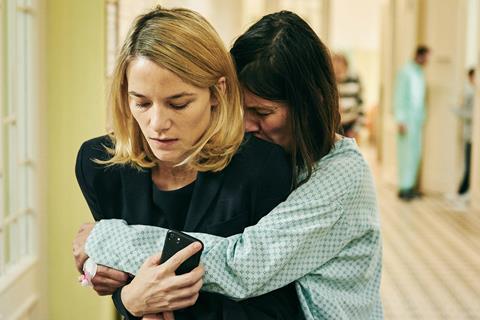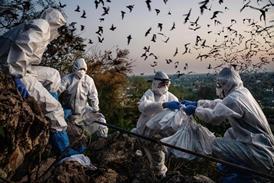Marie Kreutzer’s third feature plays with obsession and psychological disorders

Dir/scr: Marie Kreutzer. Austria. 2019. 108mins
A seemingly conventional family and social-issue drama about an overworked businesswoman with a schizophrenic older sister shades engagingly in and out of psychological thriller territory in Austrian director Marie Kreutzer’s new film. Anchored by a fine central performance by Valerie Pachner, The Ground Beneath My Feet is the latest in a line of German-language features to centre on a young female executive trying to hold down a high-pressure job in difficult circumstances (including Maren Ade’s Oscar-nominated Toni Erdmann and Christian Petzold’s fine Yella). Kreutzer’s film arguably takes its audience to less surprising places than either of those two, but it makes up for this with the assurance of what it does achieve – for example, reminding us that work can be a psychological disorder quite as real as paranoid schizophrenia.
Kreutzer’s script plays neatly with the kind of liberal, emancipated audience the film will likely attract
All focus, Lola (Pachner, soon to be seen in Terence Malick’s conscientious objector drama Radegund) is first seen jogging in a wintery Vienna, then travelling to the airport for a business trip. The voice-over musings that accompany these scenes – lugubrious stuff about “draping darkness over darkness” don’t seem to belong to the seemingly together Lola. When she’s called urgently to the bedside of her older sister Conny (Pia Hierzegger), who has just been admitted to hospital after an overdose, we assume these depressive ramblings belong to this hollow-eyed shell of a woman, who Lola clearly sees as a burden that she would rather not have to bear. But the uncertainty remains, and will play out absorbingly through the rest of the film.
Like Ines in Toni Erdmann, Lola works for a consultancy company (in Vienna) that specialises in helping other firms to ‘restructure’, trying not to dwell too much on the human cost of the free-market savagery that lurks behind this euphemism. Neither does she over-think the affair she’s having with her tough, utterly driven boss Elise (Mavie Hörbiger). Kreutzer’s script plays neatly here with the kind of liberal, emancipated audience the film will likely attract – it’s a while before we realise just how manipulative Elise is in and out of bed, and ask the question: “How would we feel about this office relationship if the boss was a man?”. It’s sister Connie who Lola sees as her main problem – she keeps ringing from the psychiatric ward, complaining of maltreatment, when all Lola wants to do is work overtime and punish her body at the gym so she can bring home a contract for the firm that she’s been working on for months.
Alternating between cubicle offices, standard-issue hotel rooms and the near-empty apartments of those who never spend much time in them, the film sets a version of old Europe – Vienna with its tree-lined avenues, bourgeois townhouses and forbidding sanatoriums – against the functional modernity of Rostock, where Lola’s workteam is on temporary placement. There’s a discourse going on here about family and memory, about what we lose if we turn ourselves into work machines who can “pull a 48” (go for 48 hours without sleep) that leeches subtly into the fabric of Kreutzer’s psycho-drama, buoyed by a fine use of setting, camera focus and colour.
Production company: Novotny & Novotny Filmproduktion
International sales: Picture Tree International, pti@picturetree-international.com
Producers: Alexander Glehr, Franz Novotny
Production design: Martin Reiter
Editing: Ulrike Kofler
Cinematography: Leena Koppe
Music: Kyrre Kvam
Main cast: Valerie Pachner, Pia Hierzegger, Mavie Hörbiger, Michelle Barthel, Marc Benjamin, Axel Sichrovsky, Dominic Marcus Singer, Meo Wulf

























No comments yet